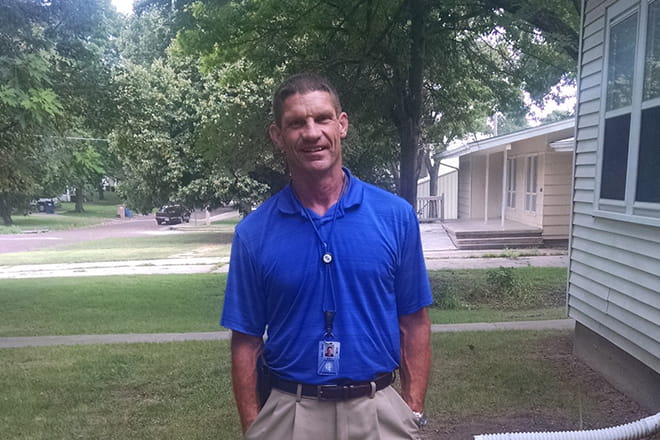It started about eight months after Ray was in a head-on car crash that fractured his fourth and fifth vertebrae, causing nerve damage in his neck and head, and left him with a broken nose, leg, collarbone and other traumatic injuries.
Over time, the distractingly high-pitched ringing made it difficult for the now 58-year-old to hear what others were saying to him, so he compensated by becoming adept at lip-reading.
That worked for Ray, a former Peabody teacher, coach and school administrator, until this past year when everyone began wearing masks because of COVID-19.
“I guess you could say the pandemic pushed me to finally get help,” he says.
So Ray turned to his family doctor, who in turn referred him to the audiology program at Ascension Via Christi Rehabilitation Hospital.
In October 2020, Ray began working with Rebekah Highfill, an audiologist who joined the Rehabilitation Hospital audiology team after completing her residency training with Ascension Via Christi the prior year.
Highfill performed a two-hour comprehensive hearing and tinnitus evaluation of Ray’s condition. Based on the results, they worked together to determine that hearing aids would be the best option for Ray to improve his ability to hear soft sounds and gain relief from his tinnitus.
“I believed hearing aids would make the problem worse,” he says. “But when I put them in for the first time, Rebekah knew from the smile on my face that the ringing had lessened.”
For Ray, that was as life-changing a moment as his accident had been.
“The first sound I recognized I hadn’t heard in a long time was the change jingling in my pocket,” he says. “I was overcome with emotion upon hearing that sound.”
Highfill enjoys the difference she can help make in patients’ lives.
“I enjoy being part of a larger team where we all work as one to help solve problems and bring relief to those who need it most,” she says.
“Ray was great to work with and was open to all treatment options and actively participated in his healthcare plan, which is important for a good outcome.”
For patients for whom hearing aids are not a good fit, Highfill provides education on the benefits of sound therapy, improved sleep hygiene and healthy lifestyle habits to help lessen the negative reaction to tinnitus.
Ray, now a landscape technician at St. Francis, is careful to follow Highfill’s advice while working, such as using hearing protection when around loud machinery to avoid further damage.
“Rebekah is very helpful, knowledgeable and somebody I’ve come to have a lot of faith in to help make things go right,” says Ray. “Though I still have to use a sound machine to fall asleep, I couldn’t imagine continuing to live with the unresolved tinnitus I was experiencing.”
After only six months of using his hearing aids, Ray is finally experiencing the relief that eluded him for half of his life.
“It is taking some time to adjust, but I believe the more I wear the hearing aids, the more I will get used to sounds I wasn’t used to,” he says. “I’m just grateful to finally feel as normal as possible in my life again.”

